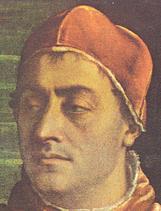 Robert
of Geneva (1342 – 16 September 1394) was elected
to the papacy as Pope Clement VII by the
French cardinals who opposed Urban VI, and was
the first Avignon antipope of the Western
Schism.
Robert
of Geneva (1342 – 16 September 1394) was elected
to the papacy as Pope Clement VII by the
French cardinals who opposed Urban VI, and was
the first Avignon antipope of the Western
Schism.He was the son of Amadeus III, Count of Geneva, of the House of Savoy, and was born in Geneva. He became the Bishop of Thérouanne in 1361, Archbishop of Cambrai in 1368, and a cardinal in 1371.
In 1377, while serving as a papal legate, he personally commanded troops lent to the papacy by the condottiere John Hawkwood to reduce the small city of Cesena in the territory of Forli, which resisted being added to the Patrimony of Peter for the second time in a generation; there he oversaw the massacre of 4000 civilians, an atrocity even by the rules of war at the time, which earned him the nickname butcher of Cesena.
From 1305 through 1377 the popes resided in Avignon, France, during the period of the Avignon Papacy, later referred to disparagingly as the Babylonian Captivity of the Church. In 1378, Gregory XI, through the encouragement of Catherine of Siena, had decided to experiment with the return of the papacy to Rome. Though he deemed the experiment a failure, shortly after his arrival, he died. Papal law decreed that the new pope must be chosen where the old pope died, so the new pope would be chosen in Rome. A Roman mob assembled and threatened violence against the cardinals if an Italian were not elected pontiff. As a cardinal Robert of Geneva voted to elect Archbishop Bartolomeo Prignano of Bar (who was not a Cardinal) as Pope Urban VI on 8 April 1378. Urban, however, was at odds with the cardinals from the beginning of his reign. Robert and thirteen French cardinals formed a coalition which sought to replace Urban by declaring his election invalid, since the conclave had been held under threat of mob violence, and held another election in which Robert was elected to the papacy at Fondi on 20 September 1378. France, Scotland, Castile, Aragon, Navarre, Portugal, Denmark, some German states, Norway, and Savoy acknowledged him as pope, but the Italians did not, supporting the opposing papacy of Urban VI. Robert consequently set up court at Avignon as Pope Clement VII. He granted most of the Papal States to Louis II of Anjou.
Robert of Geneva thus initiated the Western Schism, the second of the two periods sometimes referred to as the Great Schism, which lasted until 1417. Eventually it was determined that he would be recorded as an antipope rather than enumerated as a pope.
Uncertainty over who the legitimate pope might be during the time of the Western Schism gave rise to the legal theory called Conciliarism, which claimed that a general council of the Church was superior to the Pope and could therefore judge between rival claimants.

